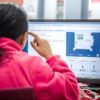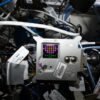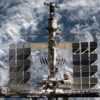The countdown begins! Astro Pi participants to have their programs run in space
This week, young people participating in the European Astro Pi Challenge 2024/25 will have their programs run in space! Astronauts from the European Space Agency (ESA) have been setting up the Astro Pi computers on board the International Space Station (ISS) ready to receive the programs.
The European Astro Pi Challenge is an ESA Education project run in collaboration with the Raspberry Pi Foundation. It has two strands: Mission Zero, where young people write programs that display pixel art on LED screens on board the ISS, and Mission Space Lab, where more advanced learners attempt to calculate the speed of the ISS by writing programs that gather data from onboard equipment.
This year has already been a great year for the challenge!

Mission Zero reaches more young people than ever
Mission Zero received 17,285 team submissions this year, representing 25,405 young people from ESA member and associate member states. This marks the highest-ever level of participation in Mission Zero since its inception back in 2017. Here at Mission Control, we’re delighted to announce that nearly all the participating teams (17,109 out of 17,285) have achieved ‘flight status’ — meaning that their programs will run in space.
It’s been great to see so many young people taking part from areas of educational disadvantage too. Through partnerships with youth organisations and community events such as Beyond the Bias and Norwich Science Festival, we’ve seen Mission Zero reach even more young creators from traditionally underrepresented groups.
The 2024/25 Mission Zero project guide featured new coded pixel art examples for teams to remix and reinterpret. Many teams also created their own artworks and animations, with amazing creativity and coding skills on display. We’ll be selecting six submissions from this year to feature as the new code examples in the 2025/26 Mission Zero project guide. Look out for more news on this in the summer.

New highs for Mission Space Lab
Mission Space Lab teams were tasked again this year with writing programs to collect data from cameras and sensors on board the ISS to calculate its speed. We’ve been really pleased to see 562 teams register and 325 submit their programs. This has resulted in an amazing 309 teams being awarded flight status — their programs will each run on the ISS for ten minutes, giving participants the unparalleled opportunity to record sensor data in space and take photos many miles above the Earth.
More teams have submitted programs and achieved flight status this year than in 2023/24. We believe this uptick is due, in part, to a couple of new additions that have made submissions easier:
- Firstly, Mission Space Lab teams can now test their programs online using the Astro Pi Replay Tool. This gives them a chance to see if their program will work on the real Astro Pis on board the ISS by replaying historical data sets captured from previous missions.
Secondly, teams have been able to use the Picamzero Python library, which makes it easier to use PiCamera2 functionality.

Deployment
Today’s the day when Mission Zero and Mission Space Lab teams with flight status will have their programs sent up to the ISS. Astronauts have been busy setting up the Astro Pi computers ready to receive the programs and putting them into position. Over the next two weeks, the programs will run and the collected data will be sent down from the ISS to Earth.

In June, Mission Zero and Mission Space Lab teams will receive certificates of participation with the exact times their programs ran on the ISS, along with the coordinates of where the ISS was above the Earth. Mission Space Lab teams will also receive a zip file with the data their programs collected.
None of this would have been possible without the hard work of all the mentors, teachers, and Code Club leaders that organise the teams of young people doing the Astro Pi missions.
Let’s stay curious, with our eyes upwards on that final frontier!
Looking for ways to keep your creators coding?
While you wait for the next cycle of the European Astro Pi Challenge, there are many other exciting coding opportunities for you and your teams to explore, including:
- Coolest Projects: Coolest Projects is a free, worldwide showcase where young digital creators share the amazing things they’ve made with technology. There’s an international online showcase as well as in-person events in several countries. Every participant gets certificates and rewards, and projects of any kind and at any level are encouraged.
- Code Club projects: Our extensive collection of Code Club projects explore Python, Scratch, the BBC micro:bit, and much more — there’s something available for all young people, no matter their level of experience.






No comments
Jump to the comment form